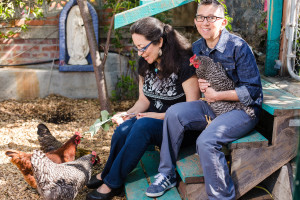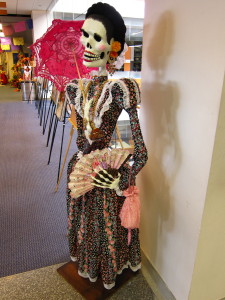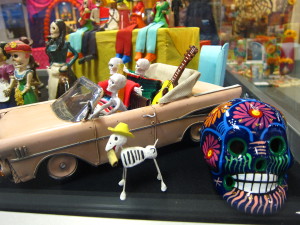Luz Calvo, Catriona Rueda Esquibel to readers: ‘(R)esist the acculturation that tells us white bread is food.’
By Sharon Simonson

A cookbook written by two San Francisco Bay Area academics that presents food and health as instruments of social change has climbed to Amazon’s top slot as the best-selling new Latin American food cookbook.
“Decolonize Your Diet” by Cal State East Bay Associate Professor Luz Calvo and San Francisco State University Associate Professor Catriona Rueda Esquibel counsels Mexican-Americans to return to the foods and preparations favored by the Americas indigenous peoples before the Spanish conquest, more particularly to their consumption of native legumes, fruits, herbs and vegetables. The book was published Oct. 13.
The change in diet is part of disgarding the legacy of colonization, “reclaiming our vitality as a people,” and “dismantl(ing) colonial systems of power,” the authors contend. “Plant-based Mexican-American Recipes for Health and Healing,” is the book’s subtitle. “Recipes to sustain revolutionary love” is the introduction’s first line.
The book’s message applies to the broad American population as well, the authors say: The commercial and industrial-scale production of American food is undermining public health, which is robbing society of strength and connection to the earth.
On Nov. 1, the authors join the Oakland Food Policy Council to celebrate Dia de Los Muertos (Day of the Dead), a national Mexican holiday to remember friends and family who have died. The Food Policy Council advocates for citizens’ right to grow food on vacant land in Oakland. Celebrity chef Bryant Terry and Orange County political columnist and Cal State Fullerton lecturer Gustavo Arrellano are also expected to attend. The three-hour event, which should include prepared dishes from the book, begins at 4 p.m. at Impact Hub Oakland, 2323 Broadway.

“The reception has been mind-blowing to us,” said Calvo. “It is so beautiful.”
The couple changed their eating habits after Calvo was diagnosed with breast cancer in 2006. In their research into her condition and treatment, they found studies that showed that foreign-born Latinas experienced breast cancer at lower rates than U.S.-born Latinas and that immigrants were healthier than their Mexican-American counterparts when they initially came to the United States. The professors came to believe that the Native American pre-conquest diet, which the immigrants retained to a greater degree, protects against diseases including diabetes and cancer.
They now grow food at their home and incorporate ingredients and dishes into their diets that they believe are akin to what indigenous Americans ate. Calvo began teaching a course called “Decolonize Your Diet: Food Justice in Communities of Color” in the fall of 2013. Calvo is the cook of the two — her grandparents were restaurateurs. Esquibel leans toward writing.
The book has 111 recipes, all of them vegetarian, derived from a multitude of sources. The authors rely on Spanish accounts of the native diet written within two decades of the Spaniards reaching the Americas. They draw upon their own family recipes as well as those gathered from students and the larger Bay Area community including restaurants. They also scoured old cookbooks. Dishes have ingredients such as hibiscus flowers and “nopal paddles, cleaned and spines removed.”
Europeans stratified people based on their food consumption and believed corn-eaters were the lowest strata, just below rice-eaters, Esquibel said. “The Spaniards wanted (indigenous Americans) to stop eating corn and to start eating wheat and barley and to grow and eat European foods. Decolonization is about recognizing that process,” she said.

Corn tortillas and tamales, perhaps the quintessential Mexican foods, date to 1500 BCE, according to the professors’ research. American natives 500 years ago did not fill tamales with beef, pork or chicken, however: They did not eat any of those meats, Esquibel said. Rather, they stuffed tamales with fruits and chile and other ingredients to produce nearly 100 variations of tamale. “The traditional diet of the Americans before the conquest was inherently pretty healthy.”
The art of decolonizing the contemporary recipes was removing ingredients like lard, sugar and flour and replacing them with native plants, Calvo said. Among the native plants she now embraces are purslane — verdolagas in Spanish — and lambs quarter, or quelites. Both had been widely considered weeds, though she remembers her grandmother gathering and cooking with them. Now they have begun to appear in the salads of adventurous chefs and are even for sale at some local farmer’s markets.
Gracias for doing this , from el Norte Las Vegas, New Mexico U.S.A.
Deep bows of gratitude for this gift to community Luz and Catriona! May we find our health through deep relationship and gratitude with the Earth and the many gifts she provides to keep us healthy. Thankful for your sharings and great work to help us find our way home to our ancestor’s medicine through food.